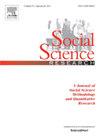Tracking in context: Variation in the effects of reforms in the age at tracking on educational mobility
IF 3.5
2区 社会学
Q1 SOCIOLOGY
引用次数: 0
Abstract
Previous research found that increasing the age at first tracking in an education system increased educational mobility. This research has implicitly assumed that these effects do not vary across contexts. Contrary to this assumption, we develop two hypotheses predicting such variation. The first hypothesis predicts that changes in the age at tracking increase educational mobility more for larger than for smaller changes in the age at tracking. According to the second hypothesis, reforms in the age at tracking only increase educational mobility if they occur in societies which put a high emphasis on equality of opportunity as a policy aim. We test these hypotheses by estimating the effects of reforms in the age at tracking, which occurred in five European countries (Belgium, Denmark, Finland, France, and Italy) in the 20th century, on educational mobility. We use data from the European Social Survey (ESS) and the Survey of Health, Ageing and Retirement in Europe (SHARE). The effects of the reforms are identified using a regression discontinuity design (RDD). A third hypothesis tests if the reforms increase educational mobility more among women than among men and if this is particularly the case in countries with a more gender egalitarian climate. Overall, the results reveal little cross-country variation in the effects of reforms in the age at tracking on educational mobility. In all analyzed countries there is an increase in educational mobility due to the reform in the age at tracking. In most countries, these effects do not differ between men and women.
情境中的追踪:追踪年龄改革对教育流动性影响的差异
先前的研究发现,在教育系统中,增加第一次跟踪的年龄会增加教育流动性。这项研究隐含地假设,这些影响在不同的环境下不会发生变化。与这一假设相反,我们提出了两个预测这种变化的假设。第一个假设预测,年龄变化对教育流动性的促进作用大于年龄变化对教育流动性的促进作用。根据第二种假设,跟踪时代的改革只会增加教育流动性,如果这些改革发生在高度强调机会平等作为政策目标的社会中。我们通过评估20世纪在五个欧洲国家(比利时、丹麦、芬兰、法国和意大利)进行的入学年龄改革对教育流动性的影响来检验这些假设。我们使用的数据来自欧洲社会调查(ESS)和欧洲健康、老龄化和退休调查(SHARE)。采用回归不连续设计(RDD)来确定改革的效果。第三个假设检验的是,改革是否更多地增加了女性之间的教育流动性,而不是男性之间的流动性,以及在性别更平等的国家是否尤其如此。总体而言,研究结果显示,年龄追踪改革对教育流动性的影响在全国范围内几乎没有变化。在所有被分析的国家中,由于年龄追踪的改革,教育流动性有所增加。在大多数国家,这些影响在男性和女性之间没有区别。
本文章由计算机程序翻译,如有差异,请以英文原文为准。
求助全文
约1分钟内获得全文
求助全文
来源期刊

Social Science Research
SOCIOLOGY-
CiteScore
4.30
自引率
4.00%
发文量
0
审稿时长
65 days
期刊介绍:
Social Science Research publishes papers devoted to quantitative social science research and methodology. The journal features articles that illustrate the use of quantitative methods in the empirical solution of substantive problems, and emphasizes those concerned with issues or methods that cut across traditional disciplinary lines. Special attention is given to methods that have been used by only one particular social science discipline, but that may have application to a broader range of areas.
 求助内容:
求助内容: 应助结果提醒方式:
应助结果提醒方式:


